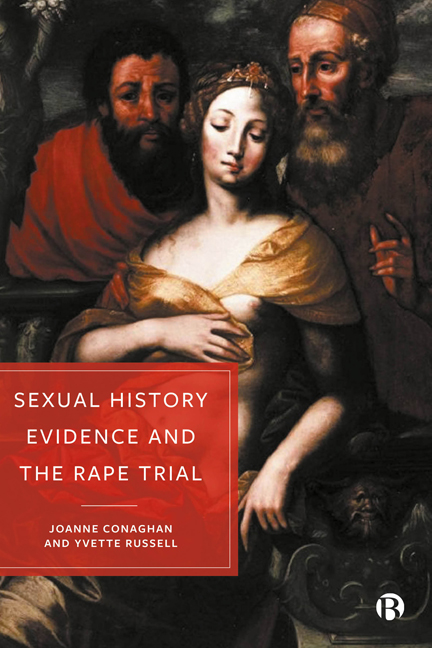Book contents
- Frontmatter
- Contents
- List of Cases
- List of Statutes
- About the Authors
- Acknowledgements
- 1 Introduction: Setting the Scene
- 2 A History of Rape Law in Action
- 3 Emergence of a Legal Regime Governing the Use of Sexual History Evidence
- 4 Legal Regulation: Limits and Potentialities
- 5 Tracking the Use of Sexual History Evidence in the Courtroom
- 6 The Relevance of Sexual History Evidence
- 7 Sexual History Evidence and Subjectivity
- 8 Conclusion: What Is to Be Done about Sexual History Evidence?
- References
- Index
4 - Legal Regulation: Limits and Potentialities
Published online by Cambridge University Press: 03 April 2024
- Frontmatter
- Contents
- List of Cases
- List of Statutes
- About the Authors
- Acknowledgements
- 1 Introduction: Setting the Scene
- 2 A History of Rape Law in Action
- 3 Emergence of a Legal Regime Governing the Use of Sexual History Evidence
- 4 Legal Regulation: Limits and Potentialities
- 5 Tracking the Use of Sexual History Evidence in the Courtroom
- 6 The Relevance of Sexual History Evidence
- 7 Sexual History Evidence and Subjectivity
- 8 Conclusion: What Is to Be Done about Sexual History Evidence?
- References
- Index
Summary
Introduction: what constitutes sexual history evidence?
Sexual history evidence is a slippery concept which is difficult to define outside the contexts in which it is invoked. We saw in Chapter 3 that it took legal shape and form within broader consideration of the relevance of evidence relating to a rape complainant’s character or reputation: an accused might seek to introduce evidence of a complainant’s propensity to lie or thieve, for example, to challenge the reliability and credibility of her testimony. In practice, the easiest way to call a woman’s character into question was to expose her lack of chastity. In some contexts, too, prior sexual history with the accused functioned formally to restrict the scope of criminal proscription, as, for example, where a husband had nonconsensual sex with his wife or, in the opinion of at least some medieval and early modern legal commentators, a man had non-consensual sex with his mistress or concubine.
Modern legislative frameworks are surprisingly shy about defining sexual history evidence with any precision. In England and Wales, section 41 of the YJCEA 1999 applies to evidence concerning ‘any sexual behaviour of the complainant’. Section 42(1)(c) clarifies that ‘sexual behaviour’ encompasses ‘any sexual behaviour or other sexual experience, whether or not involving the accused or another person, but excluding anything alleged to have taken place as part of the event which is the subject matter of the charge against the accused’. This latter clause introduces an important temporal element, which explains why this evidence is often referred to as ‘history’. Technically though, and depending on the scope of what is legally permitted, sexual history evidence may also encompass sexual behaviour taking place after the alleged offence.
The 1999 Act does not define what is ‘sexual’. However, section 78 of the SOA 2003 – which governs the definition, scope and content of a variety of sexual offences – states that
penetration, touching or any other activity is sexual if a reasonable person would consider that –
(a) whatever its circumstances or any person’s purpose in relation to it, it is because of its nature sexual, or
(b) because of its nature it may be sexual and because of its circumstances or the purpose of any person in relation to it (or both) it is sexual.
- Type
- Chapter
- Information
- Sexual History Evidence and the Rape Trial , pp. 66 - 98Publisher: Bristol University PressPrint publication year: 2023



